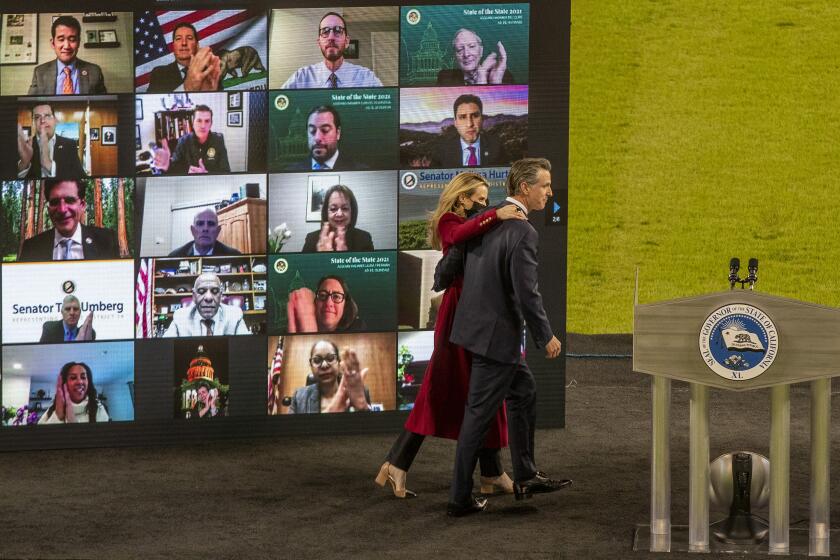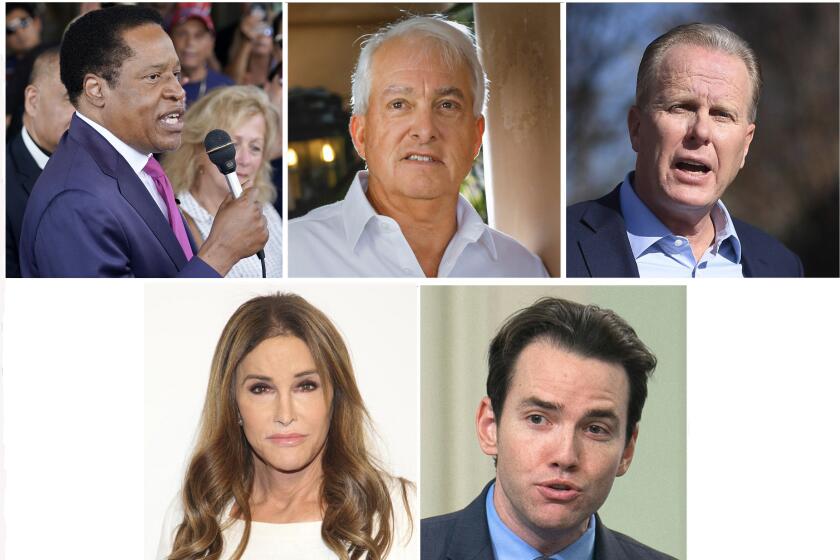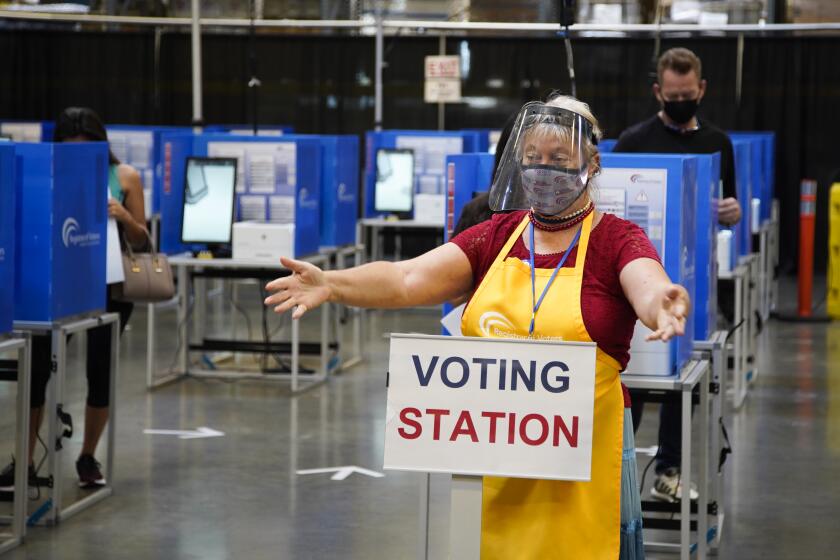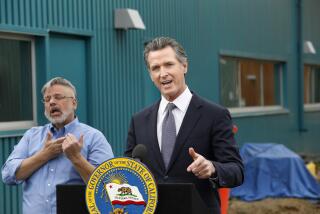Opposition to Newsom recall grows as Caitlyn Jenner, GOP generate little support, poll finds

- Share via
SACRAMENTO — The campaign to recall Gov. Gavin Newsom has failed to gain momentum in recent months as significantly more California voters favor keeping him in office, and only anemic support has surfaced for reality TV star Caitlyn Jenner while other Republican candidates hoping to take the governor’s place have little backing, according to a new UC Berkeley Institute of Governmental Studies poll that was co-sponsored by the L.A. Times.
The survey’s results were especially bleak for retired Olympic gold medalist Jenner, as just 6% of Californians who took part in the survey said they would vote to have her replace Newsom — a vast majority of Democrats, Republicans and unaffiliated or independent voters said they would not be inclined to support her candidacy.
Democratic voters polled also overwhelmingly favored having a prominent Democratic replacement candidate on the recall ballot in case Newsom was ousted from office, putting them at odds with efforts by their state party and Newsom’s campaign to prevent that from happening.
Slightly over half of California registered voters, 52%, approve of the job Newsom has been doing as governor, a small increase from January but still far below the findings in September when 64% gave him high marks, according to the poll.
That’s one of Newsom’s potential soft spots that the recall campaign’s organizers will probably try to exploit, along with strong voter dissatisfaction over how the governor has handled the homelessness crisis, housing affordability and crime in California, said Mark DiCamillo, director of the poll.
A Republican-led drive to remove Gov. Gavin Newsom from office has collected enough voter signatures to qualify for the ballot.
“Most of his decline appears to have been about the pandemic and now that we’re emerging out of that, voters are giving the governor generally better marks on the pandemic. He still doesn’t have great job performance numbers,” DiCamillo said. “If the focus then shifts away from the pandemic to the other issues facing the state, he’s gonna have some work cut out for himself.”
The poll found that leading the Republicans in the race were former San Diego Mayor Kevin Faulconer and Rancho Santa Fe businessman John Cox, who lost handily to Newsom in the 2018 governor’s race, although each had backing from just 22% of those polled. Former Northern California Rep. Doug Ose registered 14% support.
Of Jenner’s low support, DiCamillo said that, despite the media attention, “there doesn’t seem to be a significant constituency for her candidacy.”
“Even among Republicans, only 13% say they’d be inclined to vote for her,” DiCamillo said. “It’s a very poor showing.”
Jenner’s leap into the race has ginned up plenty of national media attention, and comparisons to the last major celebrity candidate, Arnold Schwarzenegger, quickly followed. Schwarzenegger, with his broad appeal across party lines, easily won enough votes to take Democratic Gov. Gray Davis’ place as governor after he was recalled in 2003.
But compared with Jenner, Schwarzenegger had a lot more support even before he officially jumped into the race. Among California registered voters, 31% said they were inclined to vote for Schwarzenegger compared with 62% who were not, according to a Field Poll conducted three months before the recall election.
Still, the effort to recall Newsom remains in the beginning stages, providing ample time for political fortunes to rise and fall. It’s only been two weeks since Secretary of State Shirley N. Weber announced that recall proponents had gathered enough signatures to force a special election by year’s end, most probably in October or November. The cost of the special election could run as high as $400 million.
And as governor of the most populous state in the union, Newsom possesses ample power and opportunities to court California’s electorate before the recall makes its way to the ballot. Aided by the state’s economic recovery and a $75.7-billion budget surplus, Newsom on Monday proposed sending $600 state stimulus checks to millions of Californians along with a $5-billion rental assistance plan.
“That’s the largest year-over-year tax rebate that’s ever been provided in any state in American history,” Newsom said Monday.
Critics quickly labeled it Newsom’s “recall refund.”
According to the poll, just 36% of registered voters in the state said they would vote to recall Newsom, the same percentage of support found in a survey by the same pollster in late January. In comparison, 49% of voters oppose removing the governor from office, a slight improvement over the 45% who opposed doing so in January.
As the effort to recall California Gov. Gavin Newsom moves forward, candidates line up to replace him.
Dan Newman, one of the governor’s political consultants, said the poll results showed that Californians were proud of what Newsom had accomplished since he took office in January 2019 and cast the recall effort as political subterfuge orchestrated by dissatisfied Republicans.
“Voters strongly support moving forward with Gov. Newsom instead of being dragged backwards to Trumpism with the Republican recall,” Newman said.
Still, 15% of voters remain undecided. According to the poll, only about a third of Democrats and independent voters have a high interest in the recall compared with the 75% of Republicans in California who do.
That may be a reflection of Republicans being excited about ousting a Democratic governor — it is only the second recall of a sitting California governor to reach the ballot. That could lead to a Republican advantage in voter turnout, though that may change once Newsom and the state Democratic Party mount what is expected to be an aggressive effort to rally their own supporters.
“Newsom benefits from the improving situation with the pandemic, but there are still some warning signs — the low interest of Democratic voters and the substantial number of undecided voters,” Berkeley IGS co-director Eric Schickler said. “But the governor is now in better shape and is helped by the absence of a compelling GOP alternative.”
Newsom’s handling of the COVID-19 pandemic appears to be a major driver of his increased support among voters — 45% of those surveyed believed the governor had done an excellent or good job, compared with 35% who said his response had been poor or very poor. That flipped since January, when 31% said he was doing an excellent or good job, and 43% gave him poor marks.
The governor’s oversight of vaccine distribution saw a similar turnaround. In January, 22% voters thought he was doing a good or excellent job on that issue. In the latest survey, support for Newsom jumped to 54%.
At the beginning of the year, the governor’s plan to distribute vaccines across a state of nearly 40 million people sputtered out of the gate. California’s vaccine plan initially prioritized all essential workers and those 65 and older. But just weeks into the plan’s rollout, the Newsom administration changed course and adopted a chronological age-based system for residents younger than 65.
As of May 9, close to 32.5 million vaccine doses had been administered statewide, with 14.2 million Californians fully vaccinated.
The latest effort to recall Newsom is one of six launched since he took office in 2019 and the only one to gather just under 1.5 million petition signatures from registered voters necessary to qualify for the ballot. The effort was spearheaded by supporters of former President Trump with assistance from far-right fringe groups and has since been embraced by mainstream California Republicans and received financial support from the national Republican Party.
A special statewide election this fall where voters could remove Gov. Gavin Newsom from office could cost $400 million to conduct, elections officials estimate.
The recall petition listed a number of long-standing Republican grievances against Newsom and the state’s Democratic leadership, including homelessness, which remains a major political vulnerability for Newsom. Of those surveyed, 57% said the governor had done a poor or very poor job addressing the crisis.
Newsom also was dinged on housing affordability, with 53% of voters saying he’s done a poor job on that issue. Criticism of Newsom’s effort to handle crime and criminal justice also is growing — 42% of those surveyed said he’s doing a poor job, up from 35% in September.
“This governor is radioactive,” said Orrin Heatlie, the official proponent of the recall effort. “The true damage that he’s done to the state won’t be known for decades.”
Heatlie pointed to the recent announcement that California might give 76,000 inmates, including some violent offenders, an opportunity for early release.
Recall organizers also believe voters will continue to be frustrated over the billions of dollars the state has paid out to fraudulent unemployment claims during the pandemic, along with Newsom’s attendance months ago at a lobbyist’s birthday party at the French Laundry restaurant in Napa Valley after asking Californians to refrain from similar gatherings.
Newsom enjoys solid support in Los Angeles and the San Francisco Bay Area, home to about half of California’s electorate. Voters there oppose the recall by roughly a 2-1 margin. However, his prospects are far less rosy in the Inland Empire and Central Valley, where support for ousting Newsom crept up slightly since January. Roughly 45% of voters in those areas support removing the governor from office, and 39% oppose it.
DiCamillo said that, according to the Berkeley poll, Newsom appeared to be in a much stronger position politically than Davis was 18 years ago, when he became the only California governor to be recalled from office. During the 2003 recall campaign, a Field Poll found that 67% of California voters had an unfavorable opinion of Davis. In the new Berkeley poll, 43% of voters had an unfavorable opinion of Newsom. DiCamillo conducted statewide opinion surveys for the Field Poll before joining Berkeley IGS.
The Berkeley IGS poll, administered online in English and Spanish, surveyed 10,289 California registered voters from April 29 to May 5. The estimated sampling error is plus or minus 2 percentage points.
More to Read
Sign up for Essential California
The most important California stories and recommendations in your inbox every morning.
You may occasionally receive promotional content from the Los Angeles Times.














